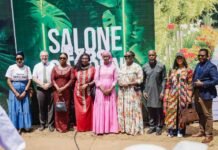By Foday Moriba Conteh
President Julius Maada Bio, on Monday 13th May, 2024 officially inaugurated a four-day Economic Community of West African States (ECOWAS) Court of Justice 2024 International Conference on the theme: “Enhancing the Role, Relevance and Effectiveness of the ECOWAS Court of Justice through the Strengthening of Synergies between the Court and National Stakeholders”.
The four-day conference ,scheduled to end on Thursday 16th May, 2024 brought together esteemed dignitaries including Chief Justices, Ministers, Judges, legal experts and representatives from ECOWAS member States at the Freetown International Conference Centre on Aberdeen in Freetown.
In his statement, before officially opening the conference, His Excellency President Julius Maada Bio expressed delight at the choice of Sierra Leone as a destination for the 2024 conference and reminded participants that the country was one of the founding members of ECOWAS in May 1975 and has remained firmly committed to the ideals and aspirations of its treaty.
The President urged member States that the need for cooperation and integration amongst the people in West Africa requires their concerted and best efforts and such cooperation and integration are partly the key to the sub-region’s prosperity and the well-being of its people.
He asserted that the establishment of the Court in 2001 was a welcome step by member countries toward fostering integration and cooperation and that the strides it had made since its inception were a testament to the importance of the great institution.
The President asserted that the gains made by the court are as a result of its expanded jurisdiction, which he pointed out is in line with the Amended Protocol of 2005, including the authority to adjudicate the alleged violation of the human rights of the community’s citizens.
He concluded by commending the leadership of the ECOWAS Court of Justice for what he described as progressive maintaining that the Court is succeeding in increasing its crucial role of providing additional justice delivery options to the citizenry of the ECOWAS community.
Earlier, Hon. Justice Edward Amoako Asante, President of the ECOWAS Court of Justice, expressed gratitude to President Bio for his support and the warm hospitality extended by the Government of Sierra Leone.
He underscored the pivotal role of the ECOWAS Court of Justice in ensuring the observance of law and justice within the community, emphasizing its mandate to interpret and apply ECOWAS treaties and protocols.
The President of the ECOWAS Court of Justice further outlined the significance of the conference saying it will serve as a platform for discussions on strengthening synergies between the Court and national stakeholders. He elaborated on the conference theme, “Enhancing the Role, Relevance and Effectiveness of the ECOWAS Court of Justice,” emphasizing the need to address concerns and explore practical solutions for the benefit of the community.
Hon. Justice Asante expressed appreciation to President Bio, the Government of Sierra Leone and all participants for their contributions to the conference. He anticipated fruitful deliberations and emphasized the conference’s potential to strengthen synergies between the Court and national stakeholders, ultimately contributing to the advancement of regional integration.
In expressing gratitude to President Julius Maada Bio for his support, Hon. Justice Nicholas C. Browne-Marke, Acting Chief Justice of the Republic of Sierra Leone, commended the President for not only agreeing to host the ECOWAS conference but also for empowering the Sierra Leone Judiciary to effectively fulfill its responsibilities in organizing the event.
Highlighting the importance of more than just the existence of a court system, Hon. Justice Browne-Marke emphasized the need for mechanisms ensuring the execution of court judgments. He attributed reluctance to comply with international rulings to the lack of an appellate process and seized the opportunity to advocate for the establishment of an Appellate Court within the ECOWAS Court of Justice.
Mohamed Lamin Tarawalley, Sierra Leone’s Attorney General and Minister of Justice, underscored the significance of the gathering as a testament to the collective commitment of the Community towards advancing justice, fostering cooperation and upholding the rule of law.
Timothy Kabba, Sierra Leone’s Minister of Foreign Affairs and International Cooperation, highlighted the challenges facing the West African region, including terrorism, unconstitutional Government takeovers, discrimination and inequality. He emphasized that amidst those challenges, justice remains the fundamental remedy for ensuring the peace, survival and stability of the region.
In his keynote address, Professor Ernest Kofi Abotsi expressed his optimism about the progress of the ECOWAS Community Court of Justice in promoting the rule of law in West Africa. He commended the Court’s willingness to embrace constructive criticism noting its potential to become a leading institution in community justice.
Highlighting the unconventional nature of courts engaging with stakeholders, Professor Abotsi emphasized the importance of reimagining the relationship between supranational courts and sub-state actors. He underscored the critical role of national stakeholders in shaping the effectiveness of the Court, from initiating legal actions to pressuring Governments for compliance with court orders.
Examining the role of the ECOWAS Court of Justice, Professor Abotsi highlighted its mandate in interpreting the treaty and subsidiary instruments of the ECOWAS community. He underscored the Court’s significance in settling disputes among member States and citizens, thereby promoting stability within the regional integration initiative.
Professor Abotsi concluded by calling for the ECOWAS Court of Justice to assert its relevance and defend stakeholder interests, championing the rule of law and holding Governments accountable for the welfare of citizens. He urged the Court to embrace engagement with stakeholders as a vital step towards maintaining its effectiveness and significance in the regional integration process.
The opening ceremony of the conference was followed by panel discussions and high-quality presentations from distinguished resource persons expected to shape the future trajectory of the ECOWAS Court of Justice within the 4 days.




